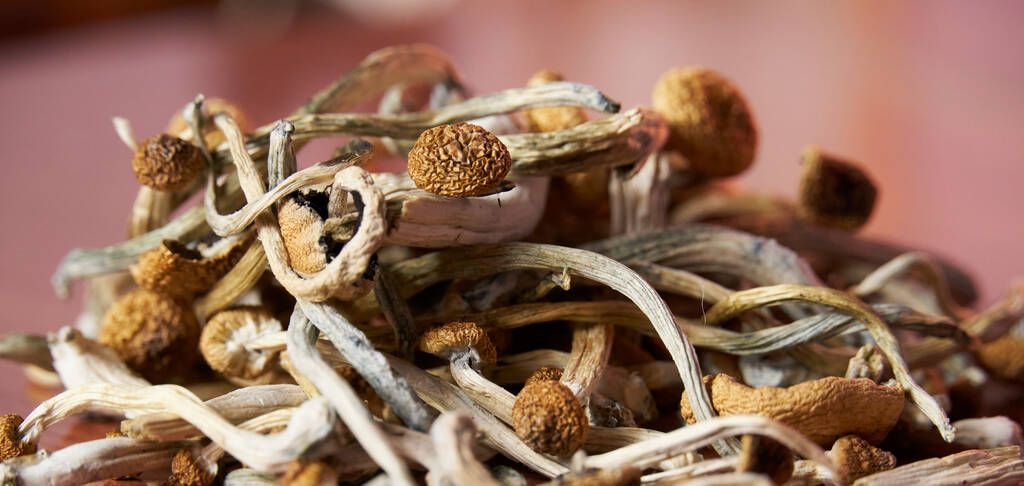Currently there are two states that have legalized psilocybin mushrooms (aka “magic mushrooms”), but that number is likely to grow in the coming months and years.

Dried psilocybin mushrooms.
Voters in Oregon and Colorado have both legalized the possession and use of psilocybin mushrooms, with Oregon doing so in 2020 and Colorado in 2022. A bill to make California the third state to do so was approved by the legislature last year but vetoed by Governor Gavin Newsom.
Already in 2024 lawmakers and activists in numerous states are pushing legislation to allow psilocybin use, with some in a far better position than others to be approved in the near future.
Here are the states most likely to legalize psilocybin in 2024:
-
Rhode Island
Last month legislation to legalize psilocybin mushrooms was filed in the Rhode Island Legislature. House Bill 7047, filed by State Representatives Brandon Potter Brandon Potter along with nine cosponsors, would legalize the possession of up to one ounce of psilocybin mushrooms, while also allowing them to be cultivated for personal use.
The law amends the state’s drug laws to state that “Nothing in this chapter shall apply to any compound, mixture, or preparation containing less than one ounce (1 oz.) of psilocybin provided the following conditions have been met:
(1) Psilocybin is in possession of one person or shared by one person to another; or
(2) Psilocybin has been securely cultivated within a person’s residence for personal use.”
The full text of House Bill 7047 can be found by clicking here.
-
Hawaii
Earlier this month legislation to legalize the therapeutic use of psilocybin mushrooms was passed through two committees in the Hawaii House of Representatives. The proposed law would legalize the possession and use of psilocybin by those with a qualifying medical condition who receives a recommendation from a licensed physician. Qualifying conditions include PTSD, treatment-resistant depression, drug or alcohol addiction and obsessive compulsive disorder, among others.
The measure would allow “facilitators” to administer psilocybin to qualified patients. Up to five grams could be administered per session. The measure mandates that each facilitator:
- Be twenty-one years of age or older;
- Have received a high school diploma or equivalent degree;
- Complete a psychedelic integration training program having a curriculum approved by office of wellness and resilience;
- Be a resident of the State; and
- Support each client during the three components of psilocybin services, including a preparation session, an administration session, and an integration session without directing the qualifying patient’s experience; provided that nothing herein shall be construed as requiring the facilitator to be physically present for the administration of psilocybin to the applicable qualifying patient.
For the full text of House Bill 2630, click here.
A companion bill with identical language has also been filed in the Senate.
-
Wisconsin
Legislation to create and fund a pilot program for the medical use of psilocybin mushrooms was recently filed in the Wisconsin Legislature with 24 bipartisan sponsors. House Bill 753 would create “a medicinal psilocybin treatment fund and a pilot program to study the effects of medicinal psilocybin treatment on patients with post-traumatic stress syndrome at the University of Wisconsin-Madison and making an appropriation.”
The measure would “create a new nonlapsible trust fund managed by the State of Wisconsin Investment Board designated as the medicinal psilocybin treatment fund and a $100,000 appropriation in 2023-24 for the UW System.”
The funding would be used “to create a medicinal psilocybin treatment pilot program at UW-Madison to study the effects of medicinal psilocybin treatment on patients with post-traumatic stress syndrome (PTSD).”
Within 6 months of the completion of the pilot program a report would need to be submitted to the governor and appropriate committees “of the legislature detailing the results of the pilot program and any recommendations for legislation based on the pilot program’s results.”
It’s the hope of proponents that if the results of such a study are positive, the legislature could legalize psilocybin, at least for medical use.






